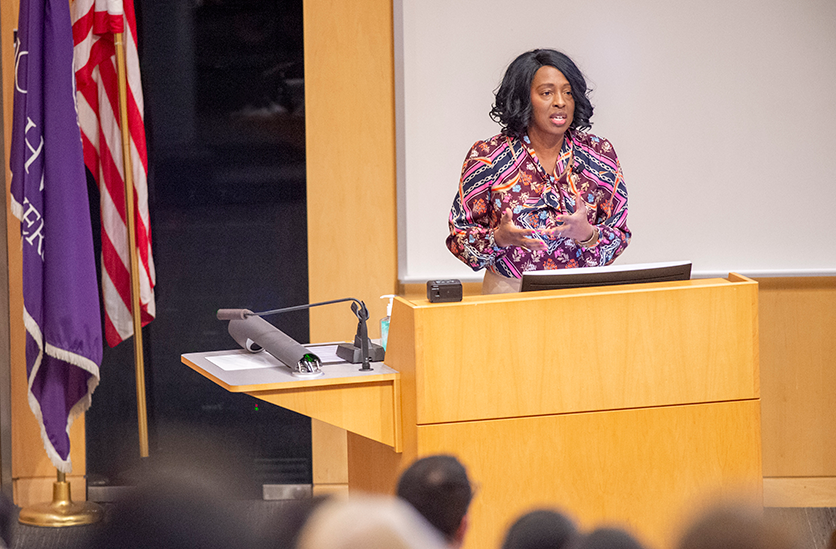‘For the common good’ Northwestern’s 2024 Population Health Forum rallies public health workers and allies from across Illinois

Health experts like Ngozi Ezike, MD, (above) converged on Northwestern’s Chicago campus in April to share research and insights on the latest challenges in public health. (Photo by Randy Belice)
Andrew Nellis
April, 9 2024
Maternal health, racial disparities, and endemic violence are some of the most pressing public health issues in Illinois and each was a central focus when health experts from across the state joined Northwestern University’s Institute for Public Health and Medicine for the fifth annual Population Health Forum, which took place April 4 in Chicago.
“The Population Health Forum is a moment to be reminded of the challenges that face our region and our world,” said Ronald T Ackermann, MD, MPH, director of the Institute for Public Health and Medicine. “The transition to coronavirus as endemic has run head-first into a mental health crisis, a pervasive epidemic of violence, and a measles outbreak devastating new immigrants and refugees and threatening unvaccinated throughout our city, particularly children.”
Held as an annual opportunity for public health leaders, scientists, students, and stakeholders to share the latest from the field, the tone of this year’s event underscored the urgency of those challenges. President and Chief Executive Officer of Sinai Chicago, Ngozi Ezike, MD, delivered the Forum’s keynote address and spoke to the new realities of the post-pandemic era and the importance of educating the broader public about the field’s central mission.
“Thinking about the breadth of public health, sometimes people don’t realize what all it entails and that in addition to trying to promote healthy behaviors and reducing chronic illness, we are also assessing maternal health and infant health, providing vaccinations, monitoring cancer statistics, and so much more,” said Ezike, who is also the former director of the Illinois Department of Public Health. “But the core focus of our work is the common good — thinking about what everyone needs and not just people in one zip code.”

The core focus of our work is the common good — thinking about what everyone needs and not just people in one zip code.”
Dr. Ezike drew from her experiences leading both Sinai Chicago, which is Illinois’ largest private safety net hospital system, and Illinois Department of Public Health to illustrate the need to engage deeply with the state’s often overlooked and misunderstood communities.
“Being equitable is hard,” Ezike said. “Being equitable takes intention. Being equitable takes perseverance, and yes, it takes more resources, but if you’re really serious about narrowing disparities, that’s what it takes.”
Echoing that message, Olusimbo Ige, MD, MS, MPH, commissioner for the Chicago Department of Public Health, sat down with Ackermann during a morning fireside chat and invoked the need for more advocacy and action across the city.
“Every individual is nested in a family and a community,” Ige said. “My encouragement to everyone is that social and family history should be a part of your medical care. We’re not likely to make the kind of progress that we want without an understanding of where a person comes from and what their story is.”
We’re not likely to make the kind of progress that we want without an understanding of where a person comes from and what their story is.”

Ige discussed ongoing programs in her department, including Healthy Chicago, a movement seeking to address health disparities and improve community health for all Chicagoans.
The Commissioner also reflected on the opportunity to lead the Chicago Department of Public Health, which, in its 200-year history has never before had a black woman as its director, and she outlined her key priorities in the coming years.
“We’re looking at both policy solutions and more tailored solutions to persistent issues like violence prevention,” Ige said. “Public health is always working to address complex problems. You cannot just do street outreach and think that violence will be solved. You need layers of investment.”
In addition to guest speakers, the Population Health Forum featured a scientific poster presentations given by faculty, students and community partners from across the state. Two posters were recognized for their scientific rigor and importance to the field.
Callie Walsh-Bailey, MPH, PhD, assistant professor of Medical Social Sciences, was awarded the Rowland “Bing” Chang Award for Excellence in Research for her poster “Barriers to cardiac rehabilitation for patients with heart failure and potential strategies to improve implementation: findings from a modified Delphi study.”
Payton Solk received the runner-up Excellence in Research Award for her poster “Feasibility and acceptability of a multi-site adaptive trial of a technology-based EHR-integrated physical activity intervention in breast and endometrial cancer survivors (MyActivity) at 6 months.”

Callie Walsh-Bailey, MPH, PhD, (left) assistant professor of Medical Social Sciences, receiving the Rowland “Bing” Chang Award for Excellence in Research from Dr. Ackermann (right). (Photo by Randy Belice).
Dr. Ezike offered closing remarks for the day, reiterating the direness of public health’s mission in the modern era.
“We’re facing a moral imperative where the stakes are truly severe — it is life and death,” Ezike said. “This is something that demands our minds and our hearts, and our moment is at hand. It’s not about buzzwords but about action, and may God help us if we cannot summon the will to seize it.”
Listen to the full remarks from both speakers in our video archive and view more photos in our gallery.
For updates on the latest from the Institute for Public Health and Medicine as well as information on next year’s Population Health Forum, subscribe to the institute’s weekly newsletter.